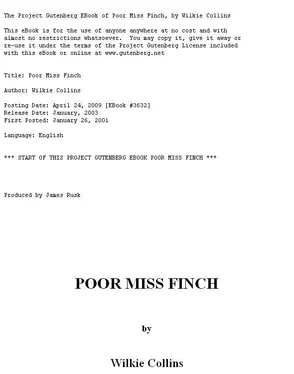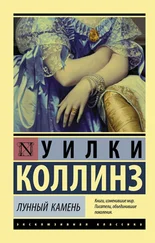Уилки Коллинз - Poor Miss Finch
Здесь есть возможность читать онлайн «Уилки Коллинз - Poor Miss Finch» весь текст электронной книги совершенно бесплатно (целиком полную версию без сокращений). В некоторых случаях можно слушать аудио, скачать через торрент в формате fb2 и присутствует краткое содержание. Год выпуска: 2002, Жанр: Классическая проза, на английском языке. Описание произведения, (предисловие) а так же отзывы посетителей доступны на портале библиотеки ЛибКат.
- Название:Poor Miss Finch
- Автор:
- Жанр:
- Год:2002
- ISBN:нет данных
- Рейтинг книги:3 / 5. Голосов: 1
-
Избранное:Добавить в избранное
- Отзывы:
-
Ваша оценка:
- 60
- 1
- 2
- 3
- 4
- 5
Poor Miss Finch: краткое содержание, описание и аннотация
Предлагаем к чтению аннотацию, описание, краткое содержание или предисловие (зависит от того, что написал сам автор книги «Poor Miss Finch»). Если вы не нашли необходимую информацию о книге — напишите в комментариях, мы постараемся отыскать её.
Poor Miss Finch — читать онлайн бесплатно полную книгу (весь текст) целиком
Ниже представлен текст книги, разбитый по страницам. Система сохранения места последней прочитанной страницы, позволяет с удобством читать онлайн бесплатно книгу «Poor Miss Finch», без необходимости каждый раз заново искать на чём Вы остановились. Поставьте закладку, и сможете в любой момент перейти на страницу, на которой закончили чтение.
Интервал:
Закладка:
POOR MISS FINCH
by
Wilkie Collins
TO MRS. ELLIOT,
(OF THE DEANERY, BRISTOL).
WILL YOU honor me by accepting the Dedication of this book, in remembrance of an uninterrupted friendship of many years?
More than one charming blind girl, in fiction and in the drama, has preceded "Poor Miss Finch." But, so far as I know, blindness in these cases has been always exhibited, more or less exclusively, from the ideal and the sentimental point of view. The attempt here made is to appeal to an interest of another kind, by exhibiting blindness as it really is. I have carefully gathered the information necessary to the execution of this purpose from competent authorities of all sorts. Whenever "Lucilla" acts or speaks in these pages, with reference to her blindness, she is doing or saying what persons afflicted as she is have done or said before her. Of the other features which I have added to produce and sustain interest in this central personage of my story, it does not become me to speak. It is for my readers to say if "Lucilla" has found her way to their sympathies. In this character, and more especially again in the characters of "Nugent Dubourg" and "Madame Pratolungo," I have tried to present human nature in its inherent inconsistencies and self-contradictions—in its intricate mixture of good and evil, of great and small—as I see it in the world about me. But the faculty of observing character is so rare, the curiously mistaken tendency to look for logical consistency in human motives and human actions is so general, that I may possibly find the execution of this part of my task misunderstood—sometimes even resented—in certain quarters. However, Time has stood my friend in relation to other characters of mine in other books—and who can say that Time may not help me again here? Perhaps, one of these days, I may be able to make use of some of the many interesting stories of events that have really happened, which have been placed in my hands by persons who could speak as witnesses to the truth of the narrative. Thus far, I have not ventured to disturb the repose of these manuscripts in the locked drawer allotted to them. The true incidents are so "far-fetched"; and the conduct of the real people is so "grossly improbable"!
As for the object which I have had in view in writing this story, it is, I hope, plain enough to speak for itself. I subscribe to the article of belief which declares, that the conditions of human happiness are independent of bodily affliction, and that it is even possible for bodily affliction itself to take its place among the ingredients of happiness. These are the views which "Poor Miss Finch" is intended to advocate—and this is the impression which I hope to leave on the mind of the reader when the book is closed.
W. C.
January 16th, 1872.
NOTE TO THE PRESENT EDITION.
IN expressing my acknowledgments for the favorable reception accorded to the previous editions of this story, I may take the present opportunity of adverting to one of the characters, not alluded to in the Letter of Dedication. The German oculist—"Herr Grosse"—has impressed himself so strongly as a real personage on the minds of some of my readers afflicted with blindness, or suffering from diseases of the eye, that I have received several written applications requesting me to communicate his present address to patients desirous of consulting him! Sincerely appreciating the testimony thus rendered to the truth of this little study of character, I have been obliged to acknowledge to my correspondents—and I may as well repeat it here—that Herr Grosse has no (individual) living prototype. Like the other Persons of the Drama, in this book and in the books which have preceded it, he is drawn from my general observation of humanity. I have always considered it to be a mistake in Art to limit the delineation of character in fiction to a literary portrait taken from any one "sitter." The result of this process is generally (to my mind) to produce a caricature instead of a character.
November 27th, 1872
PART THE FIRST
CHAPTER THE FIRST
Madame Pratolungo presents Herself
You are here invited to read the story of an Event which occurred in an out-of-the-way corner of England, some years since.
The persons principally concerned in the Event are:—a blind girl; two (twin) brothers; a skilled surgeon; and a curious foreign woman. I am the curious foreign woman. And I take it on myself—for reasons which will presently appear—to tell the story.
So far we understand each other. Good. I may make myself known to you as briefly as I can.
I am Madame Pratolungo—widow of that celebrated South American patriot, Doctor Pratolungo. I am French by birth. Before I married the Doctor, I went through many vicissitudes in my own country. They ended in leaving me (at an age which is of no consequence to anybody) with some experience of the world; with a cultivated musical talent on the pianoforte; and with a comfortable little fortune unexpectedly bequeathed to me by a relative of my dear dead mother (which fortune I shared with good Papa and with my younger sisters). To these qualifications I added another, the most precious of all, when I married the Doctor; namely—a strong infusion of ultra-liberal principles. Vive la République!
Some people do one thing, and some do another, in the way of celebrating the event of their marriage. Having become man and wife, Doctor Pratolungo and I took ship to Central America—and devoted our honey-moon, in those disturbed districts, to the sacred duty of destroying tyrants.
Ah! the vital air of my noble husband was the air of revolutions. From his youth upwards he had followed the glorious profession of Patriot. Wherever the people of the Southern New World rose and declared their independence—and, in my time, that fervent population did nothing else—there was the Doctor self-devoted on the altar of his adopted country. He had been fifteen times exiled, and condemned to death in his absence, when I met with him in Paris—the picture of heroic poverty, with a brown complexion and one lame leg. Who could avoid falling in love with such a man? I was proud when he proposed to devote me on the altar of his adopted country, as well as himself—me, and my money. For, alas! everything is expensive in this world; including the destruction of tyrants and the saving of Freedom. All my money went in helping the sacred cause of the people. Dictators and filibusters flourished in spite of us. Before we had been a year married, the Doctor had to fly (for the sixteenth time) to escape being tried for his life. My husband condemned to death in his absence; and I with my pockets empty. This is how the Republic rewarded us. And yet, I love the Republic. Ah, you monarchy-people, sitting fat and contented under tyrants, respect that!
This time, we took refuge in England. The affairs of Central America went on without us.
I thought of giving lessons in music. But my glorious husband could not spare me away from him. I suppose we should have starved, and made a sad little paragraph in the English newspapers—if the end had not come in another way. My poor Pratolungo was in truth worn out. He sank under his sixteenth exile. I was left a widow—with nothing but the inheritance of my husband's noble sentiments to console me.
I went back for awhile to good Papa and my sisters in Paris. But it was not in my nature to remain and be a burden on them at home. I returned again to London, with recommendations: and encountered inconceivable disasters in the effort to earn a living honorably. Of all the wealth about me—the prodigal, insolent, ostentatious wealth—none fell to my share. What right has anybody to be rich? I defy you, whoever you may be, to prove that anybody has a right to be rich.
Читать дальшеИнтервал:
Закладка:
Похожие книги на «Poor Miss Finch»
Представляем Вашему вниманию похожие книги на «Poor Miss Finch» списком для выбора. Мы отобрали схожую по названию и смыслу литературу в надежде предоставить читателям больше вариантов отыскать новые, интересные, ещё непрочитанные произведения.
Обсуждение, отзывы о книге «Poor Miss Finch» и просто собственные мнения читателей. Оставьте ваши комментарии, напишите, что Вы думаете о произведении, его смысле или главных героях. Укажите что конкретно понравилось, а что нет, и почему Вы так считаете.






